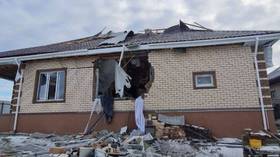This is your passenger speaking: it’s time for you greedy, overcrowded, budget-obsessed airlines to rethink your lousy service
As airline bosses make tentative steps to restart flights, it’s time for them to focus less on making money and a lot more on ending the appalling way they treat their customers. We’re tired of being ripped off for everything.
With Wizz Air resuming flights from London Luton tomorrow, those intrepid passengers who've decided that now is a good time to jet off for a break in Spain, for instance (despite no hotels, restaurants or bars being open, and foreigners being largely unwelcome) are pioneers, in a way, because they may well be the first British travellers to experience a whole new world of air travel.
As airlines around the world face massive staff redundancies, huge government bailouts and even collapse, the hope is that when a “new normal” service resumes, it will look completely different to that we’ve endured in the past.
For a start, empty seats between passengers could be mandated by law, meaning the need for flights to fly at 80 percent capacity, yet still break even. That would make ticket prices far higher than they've been in the past – unless the unlikely happens, and airlines decide to let their profits, and their shareholders, take the hit.
Somehow, I don’t think they will, because even just a quick look at the business attitudes that reign in the airline industry make it clear that profit is king and greed is good.
Also on rt.com Billionaire Branson wants government support in the pandemic downturn – and has resorted to attention-grabbing tactics to get itLook at billionaire Richard Branson, 51 per cent owner of Virgin Atlantic, with Delta Airlines – one of the world’s largest airlines – holding the other 49 per cent. They’re after a £500m UK government rescue, courtesy of the British taxpayer, which has so far been resisted – and long may that be the case, because, er, why should we?
Branson was one of the largest shareholders of UK budget carrier Flybe and, rather than save that, he went along with other investors, cap in hand, asking for a bailout. When that was denied, the airline was allowed to collapse earlier this year, taking with it 2,000 jobs. Charming.
Then we have easyJet, and its former owner, now its largest shareholder and a real irritant to the company’s board, Stelios Haji-Ioannou. While he has plenty to say – most of it derogatory – about the way the airline is run now, he was still content to take a £60 million dividend payout at the end of March, at the same time easyJet was looking to the government for help.
Then there’s British Airways, years away from ever again being “The World’s Favourite Airline”. Their CEO, Willie Walsh, never a man to waste a crisis, as his admirers will tell you, has just sacked 12,000 staff, after putting a further 22,000 on government-paid furlough.
Also on rt.com European airlines facing BLOODBATH as coronavirus crisis rocks industryThese are big, big airlines carrying millions of passengers millions of miles around the globe every year and they are in more trouble than the Hindenburg.
Elsewhere, even the German powerhouse Lufthansa, which has made a strong case of its business independence for years, has scuppered its budget airline, Germanwings, completely and is now considering asking Berlin for a bailout. Turbulence indeed.
In the years following the 2008 financial crash, air-passenger figures never fell below 10 percent and, eventually, of course, they recovered completely. Right now, however, passenger numbers have dropped by 90 percent, and industry watchers say that even when travel restrictions are eased, that number will be only around 48 percent. Heaven knows how long that will take to recover: 10 years? 20 years? Never?
But why not take a lesson from BA’s Walsh here? Let’s not allow this crisis to go to waste. It’s the perfect time to relaunch air travel. Why not bring back to the industry some of the comfort and excitement that used to surround even a short-haul flight in the years before the bean-counters got their hands around its neck to wring every last penny out of it at the expense of the “customer experience” – and all for the benefit of shareholders.
Passengers of the future are certainly going to be harder to find – and they will be a lot more demanding. No serious global business will put its top executives at risk of catching Covid-19 on planes where passengers are jammed in like sardines and sharing restrooms, oxygen and personal space with hundreds of strangers. And no holidaying family is going to want that either.
Also on rt.com No-fly year: 1.5 BILLION fewer air travellers in 2020 amid Covid-19 crisis, UN aviation agency predictsWe’ve been treated like mugs for years by these airlines: charged extra for taking a suitcase on a long-haul flight, served miserable meals, and forced into cramped seats with reduced leg-room that seems to have shrunk every time you step onto a plane.
Then we have to endure endless exhortations to buy perfume and watches from trolleys that bang into feet and elbows seemingly every 10 minutes. And should we have the temerity to make even the slightest change to our ticket or travel plans, we get mugged again, and our wallets are tipped upside down and emptied out.
So, you know what? When the airlines are ready to resume service on clean, spacious, punctual planes, in which we manage to fly at the same time as our luggage, then the dynamic will change. Of course, the airlines will say that getting a passenger from A to B costs X amount, so it follows that a ticket will cost Y amount. We will wear that. But what we won’t wear are the criminal surcharges, the fees, the pricing loopholes and the administrative costs that are piled on top of that base amount, making the ticket both extortionately expensive and highly profitable. Because maybe, instead, we will just choose not to fly.
Also on rt.com Lufthansa cuts fleet size, closes Germanwings due to Covid-19 lossesThe lockdown has shown us that staying home isn’t actually that bad, particularly when the weather’s nice, and queueing for the shops is no longer the endurance sport it was at the outset. You can buy a bottle of rosé, put some sardines on the barbecue and pretend you’re in Provence, while you sit in the sun.
We don’t need in-flight magazines, smelly restrooms, surly staff, unexplained delays, and hard-sell chocolates and camera gear, or to spend hours pressed shoulder to shoulder with a flatulent, overweight stranger munching his way through an unidentifiable chicken dish.
Unless the airlines offer us something really special, once the pandemic passes, we’ll choose to save the cash, avoid the hassle and either go for a nice drive somewhere or sit in a pub’s sunny beer garden watching half-empty planes fly overhead. And we’ll be congratulating one another that it’s not us on board.
Think your friends would be interested? Share this story!
The statements, views and opinions expressed in this column are solely those of the author and do not necessarily represent those of RT.















